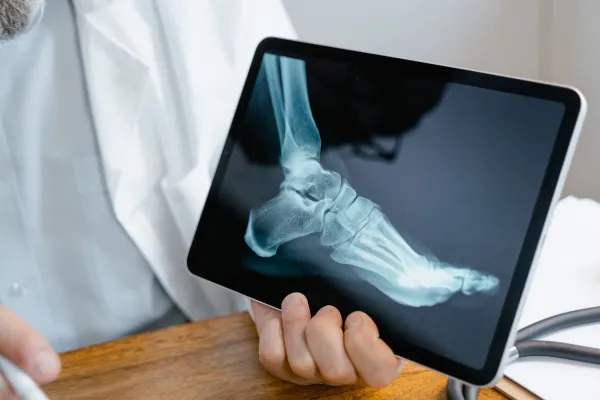Tips & Advice From West Haven Foot and Ankle Center

What Is Charcot Foot? A Simple Guide for Diabetics
If you’ve been living with diabetes for a while, you’ve probably heard your doctor mention the importance of checking your feet regularly. There’s a good reason for that—diabetes can cause serious foot problems if you’re not careful. One of the most serious (but often misunderstood) issues is something called Charcot foot.
It sounds a bit mysterious, right? Let’s break it down in simple terms, so you know what it is, how to spot it early, and what you can do about it.
What Exactly Is Charcot Foot?
Charcot foot (pronounced shar-ko) is a condition that causes the bones in your foot to become weakened and even break—sometimes without you realizing it. Over time, your foot can change shape or become deformed because the bones and joints aren't working properly anymore.
It usually happens in people who have diabetic neuropathy—nerve damage that makes it hard to feel pain, heat, or injury in the feet. Because of this loss of feeling, someone can break a bone or injure their foot and continue walking on it, making the damage worse.
What Causes It?
Charcot foot is mostly caused by nerve damage from diabetes. When you can’t feel pain or pressure, small injuries go unnoticed. Add in poor circulation and weaker bones (also common in people with diabetes), and it creates a perfect storm:
You get a small injury (like stepping off a curb wrong)
You don’t feel it, so you keep walking on it
The bone breaks down more and more
Your foot shape starts to collapse or deform
What Does Charcot Foot Look Like?
Early on, it might just look like your foot is swollen and warm. That’s one of the tricky parts—many people think it’s just a sprain or minor inflammation.
Here are common signs to watch for:
Redness in the foot or ankle
One foot feels much warmer than the other
Swelling that doesn’t go down
A feeling of instability or “wobbliness” when walking
Later on: visible changes in foot shape or arch collapsing
⚠️ Important: These symptoms can show up even without pain, especially if you have neuropathy. That’s why regular foot checks are so important if you have diabetes.
Why It’s a Big Deal (If Left Untreated)
If Charcot foot isn’t caught early, the bones in your foot can become so damaged that your foot changes shape permanently. This makes it hard to walk and can lead to ulcers, infections, or even amputation in severe cases.
But here’s the good news: When caught early, Charcot foot is treatable. The goal is to stop the damage, protect your foot, and help it heal in the right shape.
How Is It Treated?
Treatment usually starts with offloading, which means keeping weight off the injured foot to give it time to heal. This may involve:
A special boot or brace
A cast
Crutches or a scooter to avoid putting pressure on the foot
In more advanced cases, surgery may be needed to realign the bones or stabilize the foot.
After healing, many people need custom orthotics or diabetic shoes to protect the foot and prevent future injuries.
How You Can Prevent Charcot Foot
Charcot foot is serious, but there are steps you can take to protect yourself:
✅ Check your feet every day – Look for swelling, redness, or changes in shape
✅ Never ignore a warm or swollen foot, even if it doesn’t hurt
✅ See a podiatrist regularly, especially if you have diabetic neuropathy
✅ Wear proper shoes that fit well and support your feet
✅ Stay on top of your blood sugar levels to help prevent nerve damage
Let’s Catch It Early – We’re Here to Help
At West Haven Foot and Ankle Center, we understand how overwhelming diabetic foot problems can feel. But you don’t have to manage it alone. If you’ve noticed changes in your foot—or just want a check-up to be safe—we’re here for you.
Dr. Sean Lazarus has over 30 years of experience helping patients just like you stay healthy and mobile. With advanced diagnostics and a caring, family-oriented team, we make sure every step of your foot health journey is supported.
Don’t wait until things get worse. If your foot feels different, warm, swollen, or just “off,” call our office today. Let’s take a closer look and keep your feet on the right path.
Ask West Haven Foot and Ankle Center And Their Team
Fill in the form to request a call from our team. One of our team members will call you for FREE and answer any questions or concerns you may have about your condition
Where To Find West Haven Foot and Ankle Center

If you have any questions before scheduling an appointment or for general inquiries, please use the contact us button below. Our team will promptly reach out to assist you.
Opening Hours
Monday: 8am - 5pm
Tuesday: 8am - 5pm
Wednesday: Closed
Thursday: 8am - 5pm
Friday: 8am - 5pm
Saturday: Closed
Sunday: Closed

